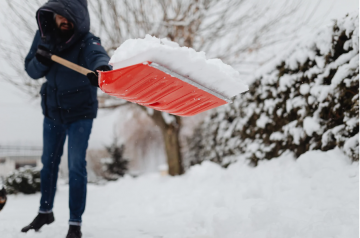
Michigan winters are known for their extreme cold, heavy snow, and icy conditions, and this week is no exception. With temperatures plummeting, it’s essential for seniors and their caregivers to have a solid winter emergency plan in place. Here’s a step-by-step guide to ensure safety and peace of mind during the harsh winter weather.
- Prepare an Emergency Kit
Having a well-stocked emergency kit is crucial. Make sure it includes:
- Non-perishable food and water (enough for at least 3 days).
- Medications: A 7-day supply of essential medications and a list of prescriptions.
- Flashlights and extra batteries: Avoid using candles to prevent fire hazards.
- Blankets and warm clothing: Include hats, gloves, and thermal socks.
- First aid kit: Basic supplies for minor injuries.
- Portable phone charger: Fully charged power banks for staying connected.
- Important documents: Copies of medical records, emergency contacts, and insurance information in a waterproof container.
- Personal hygiene items: Wipes, hand sanitizer, and any specific needs like incontinence supplies.
- Ensure Home Heating Safety
Keeping warm is critical during extreme cold. Follow these tips to stay safe:
- Inspect heating systems: Have your furnace, fireplace, or space heaters checked by a professional before the cold season.
- Use space heaters safely: Keep them at least 3 feet away from flammable items and never leave them unattended.
- Stock up on heating fuel: If you use propane or heating oil, ensure your tank is full.
- Seal drafts: Use weather stripping or draft stoppers to keep cold air out and warm air in.
- Plan for Power Outages
Power outages are common during severe winter storms. Be prepared with:
- Backup heat sources: Consider a generator but use it outdoors to avoid carbon monoxide poisoning.
- Extra blankets and sleeping bags: Layering is key to retaining warmth.
- Emergency lighting: Keep flashlights and lanterns handy.
- Battery-powered radio: Stay updated on weather conditions and emergency alerts.
- Create a Communication Plan
Staying in touch is vital during an emergency.
- Check-in system: Set up a schedule for family or caregivers to check in regularly.
- Share contact lists: Ensure everyone involved in the senior’s care has a list of emergency contacts.
- Use medical alert systems: Devices with GPS tracking and emergency buttons can be lifesaving.
- Plan for Mobility and Transportation
Icy roads and heavy snow can make travel dangerous.
- Arrange for transportation: Have a plan for medical appointments or emergencies if driving isn’t safe.
- Stock the car: If travel is necessary, keep an emergency kit in the car, including blankets, a shovel, sand or cat litter for traction, and a phone charger.
- Avoid unnecessary travel: Encourage seniors to stay home and only venture out if absolutely necessary.
- Stay Informed
- Monitor weather forecasts: Stay updated on conditions through local news or weather apps.
- Sign up for alerts: Many communities offer emergency alert systems to keep residents informed.
- Know community resources: Identify warming centers or shelters nearby in case of an extended power outage.
- Maintain Social Connections
Isolation can be a concern during extreme weather, especially for seniors living alone.
- Daily check-ins: Family, friends, or neighbors should check in daily during severe weather.
- Use technology: Video calls and messaging apps can help seniors stay connected even when stuck indoors.
- Community support: Caregivers and local organizations can provide assistance with errands or snow removal.
- Be Ready for Medical Needs
- Keep medical devices charged: Devices like oxygen machines or CPAPs should have backup power options.
- Emergency transportation plan: Know the nearest hospital or urgent care facility and have transportation arrangements in place.
- Medical ID: Seniors should wear medical ID bracelets with important health information.
Final Thoughts
Building a winter emergency plan is an essential step to ensure the safety and comfort of seniors durin harsh winter conditions. By preparing in advance and staying informed, seniors and their caregivers can face the challenges of extreme cold with confidence. Don’t wait until a storm hits—take action today to create a safer tomorrow.

